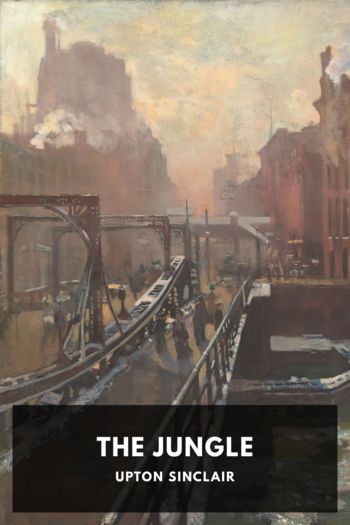The Jungle by Upton Sinclair (easy to read books for adults list TXT) 📕

- Author: Upton Sinclair
Book online «The Jungle by Upton Sinclair (easy to read books for adults list TXT) 📕». Author Upton Sinclair
“Speak English?”
“No; Lít-uanian.” (Jurgis had studied this word carefully.)
“Job?”
“Je.” (A nod.)
“Worked here before?”
“No ’stand.”
(Signals and gesticulations on the part of the boss. Vigorous shakes of the head by Jurgis.)
“Shovel guts?”
“No ’stand.” (More shakes of the head.)
“Zarnos. Pagaiksztis. Szluota!”13 (Imitative motions.)
“Je.”
“See door. Durys?” (Pointing.)
“Je.”
“Tomorrow, seven o’clock. Understand? Rytoj! Prieszpietys! Septyni!”14
“Dekui, tamistai!” (Thank you, sir.) And that was all. Jurgis turned away, and then in a sudden rush the full realization of his triumph swept over him, and he gave a yell and a jump, and started off on a run. He had a job! He had a job! And he went all the way home as if upon wings, and burst into the house like a cyclone, to the rage of the numerous lodgers who had just turned in for their daily sleep.
Meantime Jokubas had been to see his friend the policeman, and received encouragement, so it was a happy party. There being no more to be done that day, the shop was left under the care of Lucija, and her husband sallied forth to show his friends the sights of Packingtown. Jokubas did this with the air of a country gentleman escorting a party of visitors over his estate; he was an old-time resident, and all these wonders had grown up under his eyes, and he had a personal pride in them. The packers might own the land, but he claimed the landscape, and there was no one to say nay to this.
They passed down the busy street that led to the yards. It was still early morning, and everything was at its high tide of activity. A steady stream of employees was pouring through the gate—employees of the higher sort, at this hour, clerks and stenographers and such. For the women there were waiting big two-horse wagons, which set off at a gallop as fast as they were filled. In the distance there was heard again the lowing of the cattle, a sound as of a far-off ocean calling. They followed it, this time, as eager as children in sight of a circus menagerie—which, indeed, the scene a good deal resembled. They crossed the railroad tracks, and then on each side of the street were the pens full of cattle; they would have stopped to look, but Jokubas hurried them on, to where there was a stairway and a raised gallery, from which everything could be seen. Here they stood, staring, breathless with wonder.
There is over a square mile of space in the yards, and more than half of it is occupied by cattle-pens; north and south as far as the eye can reach there stretches a sea of pens. And they were all filled—so many cattle no one had ever dreamed existed in the world. Red cattle, black, white, and yellow cattle; old cattle and young cattle; great bellowing bulls and little calves not an hour born; meek-eyed milch cows and fierce, long-horned Texas steers. The sound of them here was as of all the barnyards of the universe; and as for counting them—it would have taken all day simply to count the pens. Here and there ran long alleys, blocked at intervals by gates; and Jokubas told them that the number of these gates was twenty-five thousand. Jokubas had recently been reading a newspaper article which was full of statistics such as that, and he was very proud as he repeated them and made his guests cry out with wonder. Jurgis too had a little of this sense of pride. Had he not just gotten a job, and become a sharer in all this activity, a cog in this marvellous machine?
Here and there about the alleys galloped men upon horseback, booted, and carrying long whips; they were very busy, calling to each other, and to those who were driving the cattle. They were drovers and stock-raisers, who had come from far states, and brokers and commission-merchants, and buyers for all the big packinghouses. Here and there they would stop to inspect a bunch of cattle, and there would be a parley, brief and businesslike. The buyer would nod or drop his whip, and that would mean a bargain; and he would note it in his little book, along with hundreds of others he had made that morning. Then Jokubas pointed out the place where the cattle were driven to be weighed, upon a great scale that would weigh a hundred thousand pounds at once and record it automatically. It was near to the east entrance that they stood, and all along this east side of the yards ran the railroad tracks, into which the cars were run, loaded with cattle. All night long this had been going on, and now the pens were full; by tonight they would all be empty, and the same thing would be done again.
“And what will become of all these creatures?” cried Teta Elzbieta.
“By tonight,” Jokubas answered, “they will all be killed and cut up; and over there on the other side of the packinghouses are more railroad tracks, where the cars come to take them away.”
There were two hundred and fifty miles of track within the yards, their guide went on to tell them. They brought about ten thousand head of cattle every day, and as many hogs, and half as many sheep—which meant some eight or ten million live creatures turned into food every year. One stood and watched, and little by little caught the drift of the tide, as it set in the direction of the packinghouses. There were groups of cattle being driven to the chutes, which were roadways about fifteen feet wide, raised high above the pens.





Comments (0)